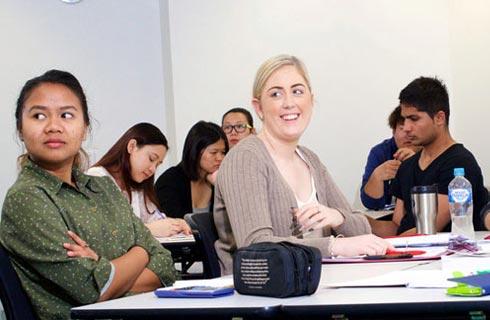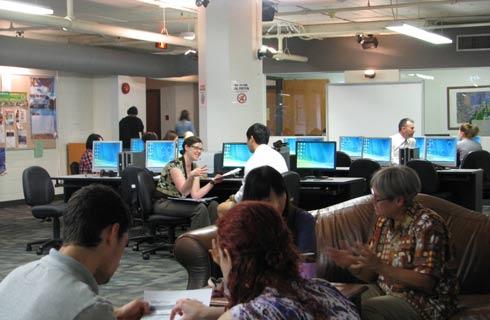音乐艺术博士
Doctor of Musical Arts

学历文凭
Doctorate (Specialised)

专业院系
School of Arts

开学时间

课程时长

课程学费

国际学生入学条件
IDP—雅思考试联合主办方

雅思考试总分
6.5
了解更多
雅思考试指南
- 雅思总分:6.5
- 托福网考总分:90
- 托福笔试总分:160
- 其他语言考试:Pearson PTE Academic - Overall score of 58 and no PTE communicative skills below 50
CRICOS代码: WI0867
申请截止日期: 请与IDP顾问联系以获取详细信息。
课程简介
The Doctor of Musical Arts at Waikato focuses on both performance and research. You'll be immersed in musical works that have artistic and creative integrity. Your performance of these works will be backed up by a written thesis that sets out your own independent research.If you're passionate about musical performance – the Doctor of Musical Arts (DMA) is the doctoral degree for you. If your interests relating to music are more in the areas of composition, research-based musicology, multimedia work, music technology or electroacoustic music, then consider enrolling in the Doctor of Philosophy (PhD) instead.While working towards your DMA at Waikato, you'll spend half your time doing performances based on your research, and the other half putting your written thesis together. You'll perform every week, and during these performances you'll demonstrate to your supervisor what you've learned from your research. At Waikato, your DMA supervisors are leading musicians and you'll be able to use a state-of-the art performing arts venue for your practical lessons.The Waikato DMA sets you up with the skills you'll need to turn your passion for musical performance into a career, whether that be as a solo artist, a chamber or orchestral musician, an accompanist, recording artist or repetiteur. You might prefer to use the skills you've learned in a different way, and work in either radio or print music journalism. You might also want to share what you have learned during your DMA and take on a teaching role, either as a performer-academic working in the tertiary area or as an instrument or vocal teacher.You'll be able to choose a research topic that interests you. Topics previously chosen by students completing a DMA include those focusing on particular composers (such as New Zealand cellist and composer Arnold Trowell and New Zealand composer John Ritchie); a particular aspect of musical composition in performance (such as J.S. Bach's use of the variation form in treating Lutheran chorales); musical education (such as the application of ICT in the music classroom: Tools and trends in the New Zealand secondary classroom from 2007-2009); specific cultural music traditions (such as Kīngitanga and Music: An examination of repertoire and composition of Māori waiata and puoro relating to the Kīngitanga (King Movement) from 1912 to 2008); and using technology in music (such as a mouse driven interface for virtual stringed instrument controller).
相关申请
 预科
预科 奖学金
奖学金 实习机会
实习机会 在校学习
在校学习 跨境学习
跨境学习 校园授课-线上开始
校园授课-线上开始 在线/远程学习
在线/远程学习
学校排名

世界排名401
数据源:泰晤士高等教育世界大学排名
关于怀卡托大学

怀卡托大学成立于1964年,被公认为新西兰研究实力顶尖的大学,在2025年QS世界大学排名中位列新西兰前三,全球排名第235位。怀卡托管理学院位列全球商学院前1%。学院以追求卓越和创新而闻名,提供由顶尖学者和知名国际教授授课的优秀学术课程。怀卡托大学每年提供超过2000个实习机会或行业主导的项目,并与政府、行业和社区组织建立了牢固的合作伙伴关系,从而为学生提供更广泛的职业选择和实践学习机会。该大学在汉密尔顿和陶朗加拥有两个充满活力的校区,均位于新西兰出口导向型经济的中心地带。这两个校区营造了充满活力、包容的氛围,营造了一个互相支持的社区,让学生在学业和社交方面都能蓬勃发展,让他们在学习期间感到宾至如归。校园内拥有70多个俱乐部和120多个社团,学生可以参加各种各样的活动。这些俱乐部涵盖各种类别,从学术俱乐部、兴趣俱乐部到体育和文化组织,满足学生的广泛兴趣。国际学生还将获得全面的学业和职业支持,帮助他们适应新国家的生活。
本校相关课程
其他相关课程

音乐与声音设计学士国际研究文学士
 悉尼科技大学
悉尼科技大学学历文凭
Dual Degree
开学日期
课程费用总额


音乐和声音设计学士学位
 悉尼科技大学
悉尼科技大学学历文凭
Bachelor Degree
开学日期
课程费用总额


音乐学士(专业)
 中央昆士兰大学
中央昆士兰大学学历文凭
Bachelor Degree
开学日期
课程费用总额


戏剧学士(专业)
 中央昆士兰大学
中央昆士兰大学学历文凭
Bachelor Degree
开学日期
课程费用总额


音乐硕士(表演研究)
 阿德莱德大学
阿德莱德大学学历文凭
Masters Degree (Coursework)
开学日期
课程费用总额


音乐荣誉学士
 伊迪斯科文大学
伊迪斯科文大学学历文凭
Bachelor Degree with Honours
开学日期
课程费用总额





















 新西兰
新西兰










